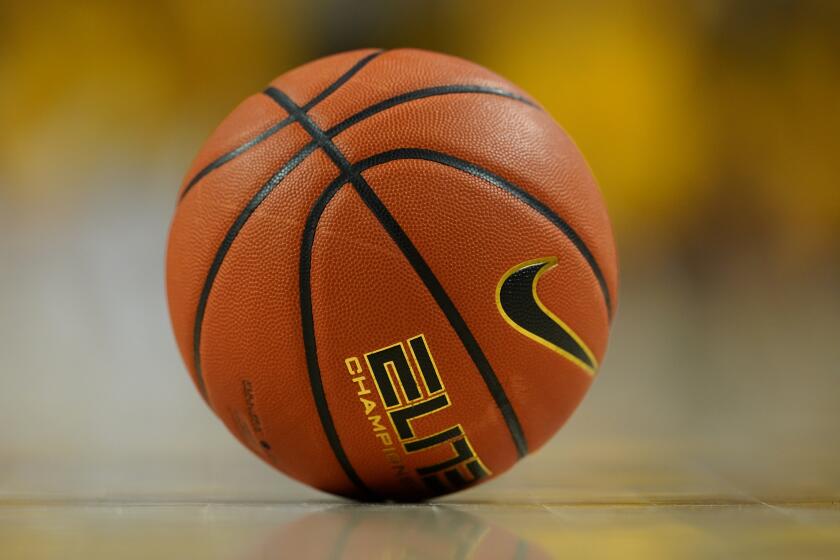Lawrence More Than Holds Own
- Share via
Like to get away from it all? Have your phone stop ringing, stop getting junk mail, unwanted invitations, interruptions when you’re eating?
Try the interior line of a pro football team. It’s the ultimate hideout, the athletic version of a mountain shack in the Yukon or where elephants go to die. Even your personal mail comes addressed, “Occupant.”
It’s not a position, it’s a hermitage. Howard Hughes would have loved it.
But there’s a catch. You can slave away happily for years in total darkness and anonymity. But the minute something goes wrong, lights come on, doors bang, bells clang, sirens wail, you are denounced in print, and somebody is, in effect, shouting at you, “OK, we know you did it--’fess up! What you did with the baby.”
You are suddenly Public Enemy No. 1. You need a lawyer and a kind word.
Take Henry Lawrence of the Raiders. Henry was sailing along, minding his own business, knocking down 260-pound ends, making 60 blocks a game for 157 straight games for the Raiders. And no one knew him from Lawrence of Arabia.
Then, early in the second quarter of the game against the Philadelphia Eagles last week, Henry blew his cover.
Now, ordinarily, if you hold your opponent on a touchdown pass play in this game, two things will happen: The back judge will miss it-- and Jessie Hester will drop the ball.
But this time, two longshots came in. The judge caught the hold. And Hester caught the ball.
Sixty-thousand people who didn’t know he was there a moment before and uncounted millions watching on TV are suddenly looking at Henry Lawrence as if he had stolen the Lindbergh baby. They are announcing his shame over the loudspeaker and coast-to-coast television. He is getting publicity, all right--just the way Bonnie and Clyde did. Or the guy who shot the Pope.
It’s like being a good waiter. No one at the table can remember what he looks like or what his name is--until you find a fly in your soup. Then, you want him indicted. Nobody writes about the good a pastor does, the night calls, the solace, the distribution to the poor. But let him get caught giving a choirgirl a peck on the cheek and the tabloids have a field day: “Vicar’s Love Nest--a Choir Loft!”
Henry Lawrence can empathize. The called-back touchdown only meant the difference to his team between backs-to-the-wall football or we’re-in-the-driver’s-seat in the race to the playoffs’ wild-card spot.
The psychologists tell us some people misbehave intentionally to get attention, but Henry Lawrence not only didn’t want attention, he didn’t even do what they said he did, he insists.
Either it was a case of mistaken identity--all offensive linemen look alike, even to back judges--or the fact that Henry was sitting on the defensive end that led the zebra to jump to conclusions. Henry can explain everything, he insists. He got blocked into the man, on top of him, and he meant to let him up as soon he could get his arms untangled.
Henry deserves to be known for something besides high crimes and misdemeanors, anyway. For 13 years now, he has been one of the premier linemen in the National Football League, in a skill position and carrying on a great tradition of Raider artisans at the profession like Art Shell and Gene Upshaw. Henry, whose nickname in high school was Killer, in honor of the number of people who had difficulty frosting a mirror when Henry hit them head-on, has never really needed to hold anybody.
Actually, being overlooked is something Henry is far more used to. It all began when he was one of the guinea pig generation in the South when the Supreme Court mandated integration.
“I was going to Lincoln High in Palmetto (Florida), an all-black school,” he says. “We used to beat people 80 or 90 to nothing. And I had over 200 letters from schools like Notre Dame, West Point, the Naval Academy, the Carolinas, the Big Ten, trying to recruit me.”
When the segregated school was closed and Henry had to enroll in the integrated school at Bradenton, he suddenly found himself benched. Henry is loath to ascribe it to racism, but even a casual observer has to wonder what sort of material the coach had to relegate a future All-Pro to third string.
“If we were winning, I could relate,” Henry says. “But we were losing.”
For whatever reason, his playing time dried up and so did the scholarship offers. Gone were the requests for letters of intent, and Henry had to settle for an all-black school, Florida A&M.;
There, where the competition really was deep, Henry became a legend, going up against--and beating on the line of scrimmage--such other future All-Pros as John Matuszak, then at Tampa, and Too Tall Jones, then at Tennessee State. Henry was in the Shrine Game, the Senior Bowl, the All-America Bowl and was No. 1 draft pick of the Raiders before his career was through at A&M.;
Playing in an interior line is a selfless, martyring kind of existence, but it’s practically life at the top and in a spotlight to Henry. Henry comes from a long line of people who made their living in the real hold of humanity, the hot sun and back-breaking furrows of America’s bean fields.
“I was practically born in the fields,” he says. Mother and Dad were on their way north, picking crops in Pennsylvania at the time. Mama got a brief respite when little Henry came along.
As soon as he could walk, he joined the family business. “We picked whatever crop was ready, starting from Florida and working north as the summer went on, living in shacks, buying from peddlers. We showered in sprinklers, slept on floors, traveled by bus. We got 6 cents a bag for potato picking and 70 cents an hour for corn.”
After that introduction to the American dream, it can make blocking Reggie White seem like blocking Vanna White and can make playing in the NFL seem like the fanciest kind of silk-sheet, breakfast-in-bed living.
In fact, Henry can be philosophical about any optional kind of money-making up to and including taking 15-yard undeserved penalties.
In fact, he owes his whole career to a tomato patch. Disillusioned at college once, fed up with being unappreciated, Henry called home. He was through with the game and the school, he wanted to come home, he told his mother.
“Good!” she said. “Come on home. We’ll get your pail ready. The tomatoes are just coming in!”
Henry went back and made the team, the pros and an accommodation with life to take what comes. If you’re going to be anonymous, it’s better to do it on a goal line with a number on your back than in a pea patch with a burlap bag on it.
More to Read
Go beyond the scoreboard
Get the latest on L.A.'s teams in the daily Sports Report newsletter.
You may occasionally receive promotional content from the Los Angeles Times.










